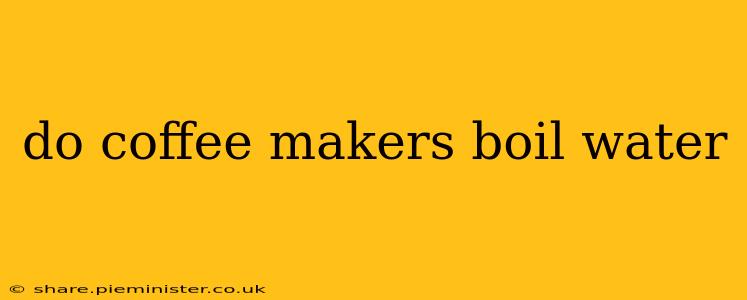Do Coffee Makers Boil Water? A Deep Dive into Brewing Methods
The simple answer is: most coffee makers don't technically boil water, but they do heat it to near-boiling temperatures. The distinction is crucial for understanding how different brewing methods impact the final cup of coffee. Let's explore this in detail.
While the precise temperature varies between coffee maker models and brewing methods, most machines heat water to a range between 195°F (91°C) and 205°F (96°C). This is significantly hotter than the ideal serving temperature but crucial for proper coffee extraction. A full rolling boil (212°F or 100°C) can scorch the coffee grounds, leading to a bitter and unpleasant taste.
What Happens During the Heating Process?
Most automatic drip coffee makers use a heating element to raise the water temperature. This element is typically located in a reservoir or directly beneath the carafe. The water is heated until it reaches the optimal brewing temperature, then it's usually dispensed over the coffee grounds. The process is carefully controlled (in most modern machines) to avoid overheating.
Different Coffee Makers, Different Temperatures
The temperature achieved will vary based on the type of coffee maker:
-
Automatic Drip Coffee Makers: These are the most common type and generally heat water to the near-boiling range mentioned above. Variations exist among models, but they generally prioritize consistent temperature for optimal extraction.
-
Pour Over Coffee Makers: These require you to manually heat the water, often using a kettle. Precise temperature control is critical for pour-over brewing, as it directly affects extraction. Many enthusiasts use gooseneck kettles for greater control.
-
Espresso Machines: These machines heat water under high pressure to create espresso. The water reaches a near-boil, but the pressure is the key factor in creating espresso's concentrated flavor.
Why Coffee Makers Don't Boil Water (Usually)
Boiling water can damage the delicate compounds in coffee beans, resulting in a burnt and bitter taste. The optimal brewing temperature is a carefully balanced range that extracts the desired flavors and aromas without over-extracting the bitter compounds.
How Does Water Temperature Affect Coffee Taste?
Water temperature significantly impacts the final taste of coffee. Water that's too cold will under-extract the coffee, resulting in a weak and sour brew. Conversely, water that's too hot will over-extract, leading to a bitter and astringent cup.
What Temperature is Best for Brewing Coffee?
The Specialty Coffee Association (SCA) recommends a brewing temperature between 195°F (91°C) and 205°F (96°C). This range is considered the sweet spot for balanced extraction, ensuring a flavorful and aromatic cup of coffee.
Does the Type of Coffee Maker Affect the Brewing Temperature?
Yes, different coffee makers use different heating methods and may vary slightly in their ability to maintain the optimal brewing temperature. High-end machines are generally better at controlling and maintaining temperature consistency than lower-priced models. Some even have programmable temperature settings.
In conclusion, while coffee makers don't typically achieve a full rolling boil, they heat water to temperatures approaching boiling, precisely controlled to optimize the extraction process and deliver a delicious cup of coffee. Understanding these nuanced temperature differences helps to appreciate the science behind a perfect brew.
